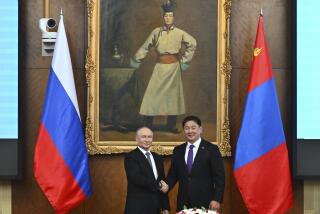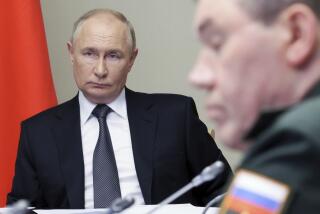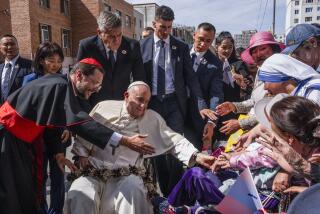Russia Denies Entry to Tibetan Leader
MOSCOW — The Russian government reversed course Friday and denied a visa to the Dalai Lama, complaining that the exiled Tibetan leader mixes politics with religion to a degree unacceptable to China--and, by extension, to Russia.
“Evidence of this is, among other things, the inclusion in the delegation of members of the so-called Tibetan government-in-exile, artists and other figures,” said Boris Malakhov, spokesman for the Foreign Ministry.
The ministry previously indicated that it would approve the visit, which would be the Dalai Lama’s first full official visit since the collapse of the Soviet Union. The Tibetan leader made an unofficial visit to Buddhist regions in 1992, and received a transit visa for a journey to Mongolia in 1996. However, a similar request for a transit visa was denied last year.
“Account should naturally be taken of the position of the People’s Republic of China, whose leadership takes a strongly negative attitude to the Dalai Lama’s political activities,” Malakhov said.
China occupied Tibet in 1950 and remains wary of the influence of the Dalai Lama, who fled the region after Chinese forces crushed a rebellion in 1959.
Russian Buddhists reacted strongly to the visa decision.
“It looks as if China and its geopolitical interests are more important to the Kremlin than the needs of Russian Buddhists--who are, by the way, Russian citizens,” said Antonina Kookuyeva, president of the Friends of Tibet society in the republic of Kalmykia, one of the stops on the Dalai Lama’s canceled itinerary.
Russia has about 1 million Buddhists, mostly in the southern republics of Buryatia, Tuva and Kalmykia. They are descendants of Genghis Khan, whose horde swept out of Mongolia and into Europe in the 13th century, subjugating Russia for more than two centuries.
Dulma Shagdarova, chairwoman of the Assn. of Traditional Buddhist Communities, described the Russian decision as “outrageous.” She noted that the Chinese complain to other countries about the Dalai Lama, but those complaints usually are ignored.
“The Russian government has treated the Dalai Lama in a very bad way--they canceled his visa as if he is some kind of a criminal who should not be allowed to enter the country,” she said. “I am lost for words, really.”
The regime of President Vladimir V. Putin, who took office in 2000, has run hot and cold on relations with China. Early in his term, Putin made special efforts to improve strained relations with Beijing, arguing that an Asian-oriented foreign policy would be a counterweight to American hegemony. That changed after Sept. 11, when he expressed solidarity with the United States and Russia’s relations with China appeared to take a back seat.
However, Prime Minister Mikhail M. Kasyanov is scheduled to visit China next week to discuss trade and military cooperation, and Putin is said to be considering a visit by the end of the year.
The Chinese Embassy in Moscow declined to comment on the Dalai Lama’s visa denial, referring to a statement posted on its Web site.
“The Dalai’s words and deeds have showed that he is no longer only a religious leader as he claims,” the statement said. “On the contrary, he has become [a] political leader engaged in long-term divisive activities abroad.”
The Dalai Lama’s representative in Russia, Navang Gelek, denied that his delegation would have included members of the Tibetan government-in-exile, which is based in India.
“There would have been 10 members in the delegation and none of them is a minister,” he said. “It is unclear why the Russian Foreign Ministry is saying such things. We do not understand why they had to think up all this. We are very surprised.”
*
Alexei V. Kuznetsov of The Times’ Moscow Bureau contributed to this report.
More to Read
Sign up for Essential California
The most important California stories and recommendations in your inbox every morning.
You may occasionally receive promotional content from the Los Angeles Times.










